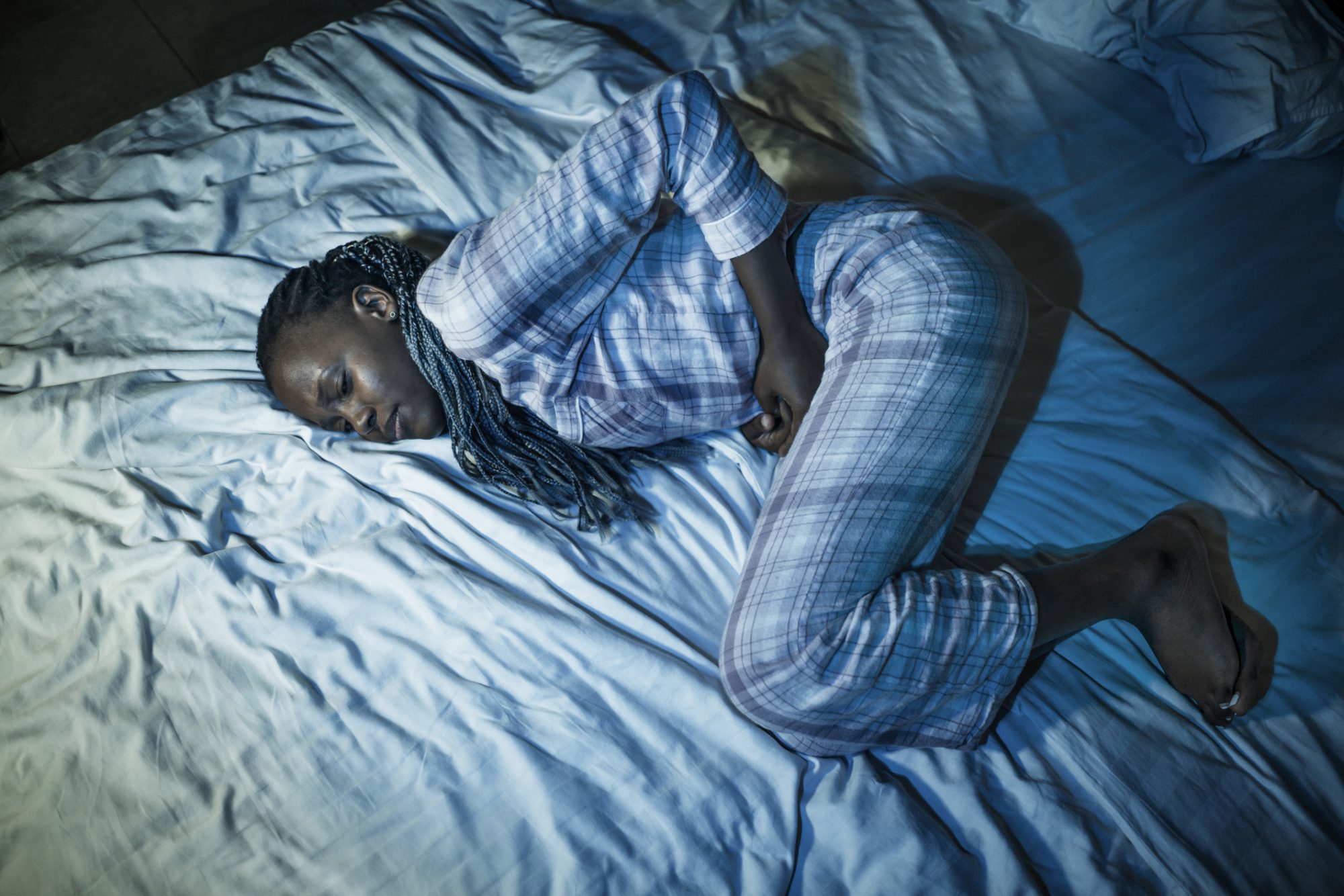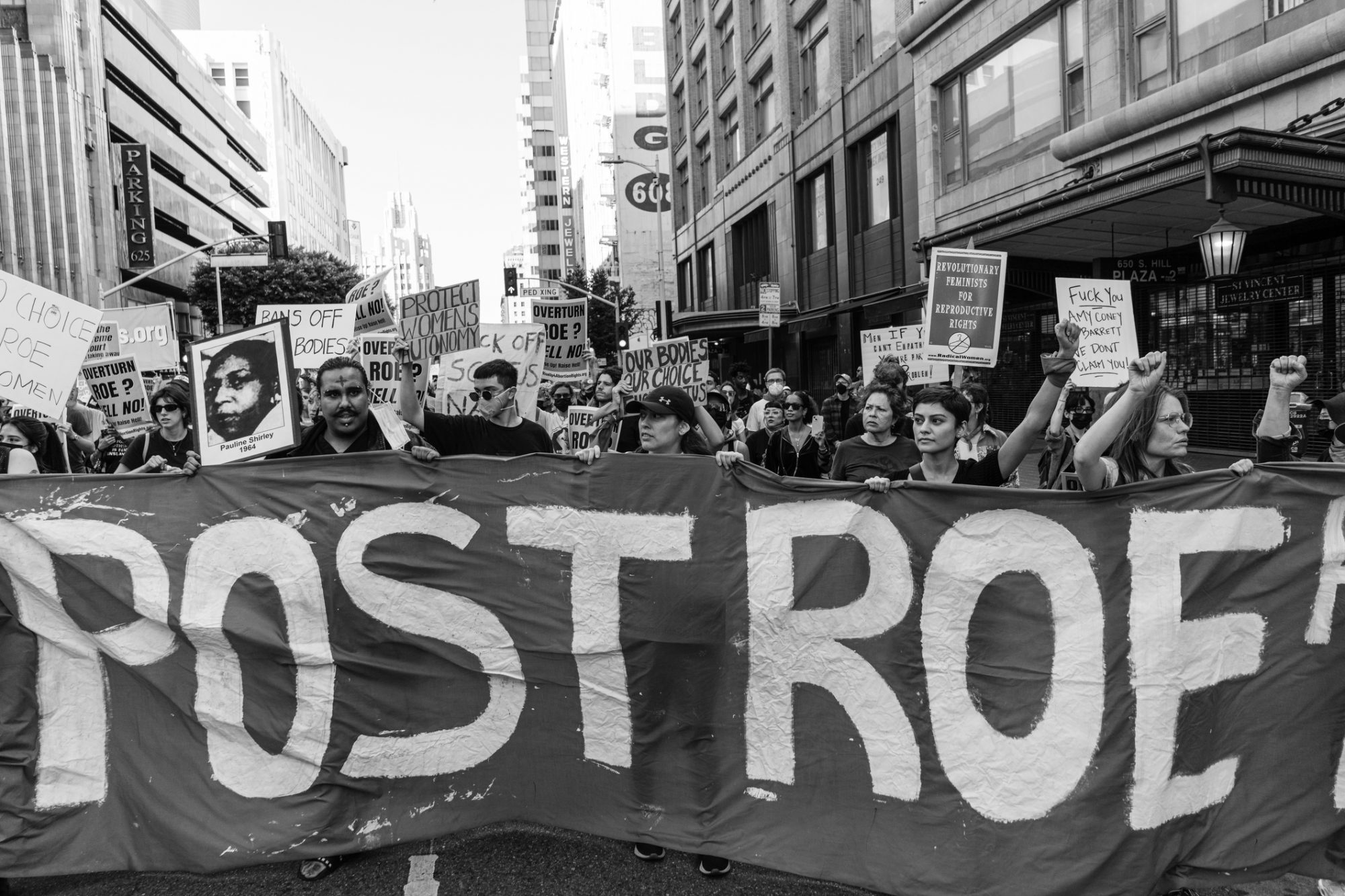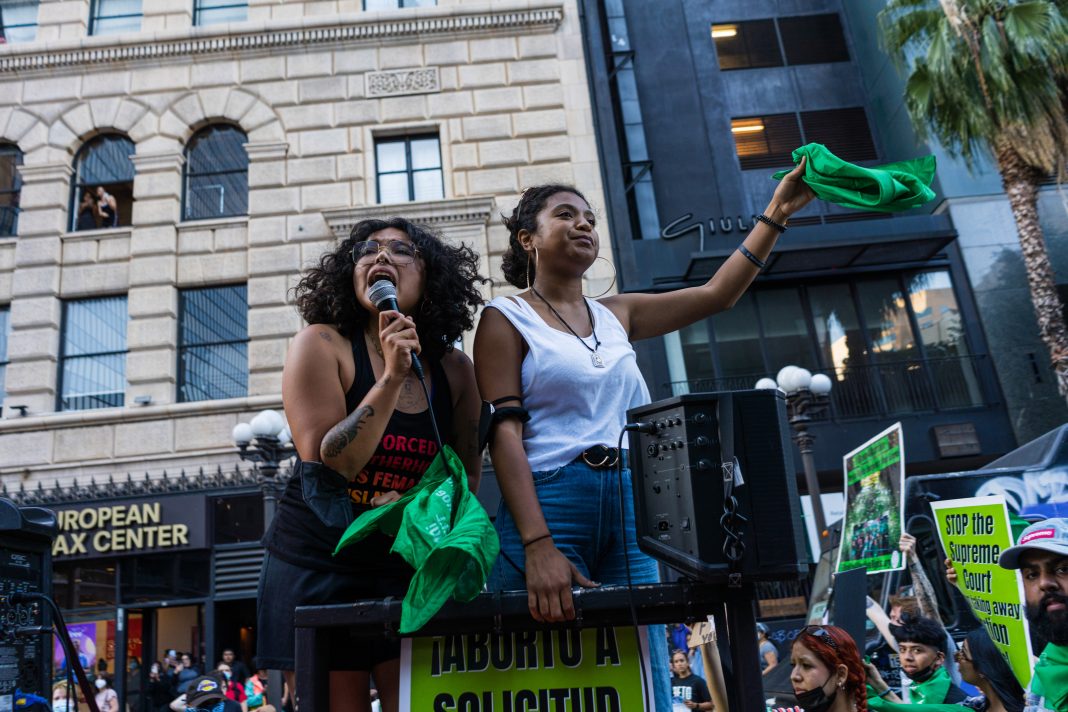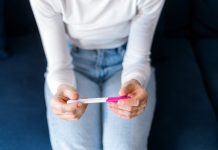The recent upturning of Roe v. Wade in the U.S. raises concerns for women’s reproductive safety and rights, as abortion bans make the procedure illegal in more states
The 24th of June 2022 saw the US Supreme Court make its final ruling on abortion access, with 5 of the 9 judges voting in favour of overturning Roe v. Wade, subsequently creating a complete abortion ban in seven states, and 17 other states soon to follow.
The overturning of Roe v. Wade shows not only a disregard for women’s choices and human rights but also represents a wider assault on reproductive rights for all who can get pregnant.
What the overturning demonstrates is a disregard for all except those who identify as, and are biologically male.
Access to safe abortions is now at risk for millions of people in the U.S, as abortion bans have made the procedure illegal in some states, with the overturning of Roe v. Wade – the case that established women’s constitutional right to abortion in 1973.
Abortion is a medical procedure that terminates a pregnancy, which millions of women, girls and people with wombs use every year. Around 1 in 4 pregnancies end in an abortion every year, according to Amnesty International.
According to the UNFPA’s 2022 State of World Population report, almost half of all pregnancies worldwide are unintended, and over 60% of these may end in abortion. If abortion is not made a legal procedure, it will still occur – but unsafely.
While pro-life arguments insist that life begins at conception, and all pregnancies should be carried out, researchers and women alike raise concerns about the health and economic consequences this could induce. It has been pointed out that those arguing for the ‘protection of life’ (indicating that a baby is being killed when aborted as an embryo) are overlooking the serious consequences pregnancy can have on both a mother and their child.
Some of the frequent complications women can develop during their pregnancy include:
- Deep vein thrombosis in pregnancy
- High blood pressure (hypertension)
- Itching and intrahepatic cholestasis of pregnancy
- Anxiety and depression
- High blood pressure
- Gestational diabetes
- Infections such as UTIs
- Preeclampsia
- Preterm labour
- Miscarriages
- Stillbirth
- Severe, persistent nausea and vomiting
- Iron-deficiency anaemia
- Ectopic pregnancy
- Placental complications
- Amniotic fluid complications
- Obesity and Weight Gain
- Vaginal bleeding
- Convulsions/fits
- Severe vomiting
There are few other experiences which are as physically and psychologically draining as pregnancy. Pregnancy is a serious experience which can leave people disabled or mentally ill, with the process frequently resulting in injury and even death. Forcing an individual to undergo this process against their consent when safer alternatives exist can be considered barbaric and backwards.

‘Pro-life’ until the child is born
While consenting to sex does not equate to consenting to pregnancy, abortion exists in numerous countries as a safety net for women who are mentally, financially, or physically unready to bear a child.
The average cost of giving birth in the U.S is between $4,000 to $15,000, and childcare costs average at $14117 yearly. If the pro-life cause was just about protecting children, there surely must be more regulations in place for new parents to better raise, afford and protect their children.
The average cost of giving birth in the U.S is $4,000 to $15,000, and childcare costs average at $14117 yearly.
Healthcare in the U.S is the most expensive out of every nation in the world, with some of the shortest maternity leaves and no mandatory maternal pay, concerns for the already staggering cost of food, resources, education, and overall standard of living are warranted.
Currently, around 45% of all abortions around the world are unsafe, meaning they are not done by a professional (commonly due to lack of legality), making the procedure a leading cause of maternal death on a global scale.
Banning abortion and a woman’s right to choose has the potential to increase poverty in the USA, as well as create an influx of maternal health issues which most parents, especially those below the poverty line will be unable to pay for. As these maternal health issues increase, certain demographics will be hit harder than others with maternal mortality being two to three times higher for Black women than white women.
In cases of rape and incest, which are some of the most argued cases for advocates of abortion rights, there exists a danger of not having safe access to abortion for those who are unwillingly impregnated by an abuser.
If a girl can become pregnant after the beginning of her period, girls as young as 10 years old are at risk of becoming non-consenting mothers – posing a danger to their bodies and minds. This is a disturbing reality for young girls who are already legally allowed to be forced into child marriages in 44 U.S states.
Girls as young as 10 years old are at risk of becoming non-consenting mothers
Along with this, babies born of incest have a higher likelihood of developing birth deformities, and children conceived through rape and abuse are at a higher chance of also being abused, too.
Abortion access isn’t just about the safety and rights of women, and those who become pregnant, it is also about the safety of children potentially being born into impoverished, abusive, or unwilling families.
As the U.S is the country with the highest amount of school shootings globally, the U.S has done little to protect children’s lives post-birth. The system does not protect children once they are born, so banning a woman’s right to choose to have a child is dangerous in this regard.
Over the next few years following the overturning of Roe v. Wade the U.S can expect to see a considerable increase in population, however, as of now both homelessness and the number of children being placed in foster care are still on the increase. Currently, 30% of all homeless people in the country consist of families with young children and there are over 400,000 children in the foster system across the country. Children in these scenarios are at increased risk of abuse, neglect and experiencing health problems – and it is apparent these numbers are only going to increase following the Supreme Court’s decision. The adoption and foster care system cannot afford or manage to take in more children.
A shortage of breast milk formula occurred in the US in May 2022
U.S Republicans have traditionally held more conservative points of view regarding progressive legislation like Roe v. Wade and same-sex marriage. Whilst holding these pro-life and anti-abortion stances, numerous Republicans have continued to reject the idea of universal access to healthcare and barely vote for increasing access to the basic material needs of children with food, clothing, shelter, and childcare, and now, baby formula too. In just May of 2022, 192 Republicans voted against a $28 million aid boost for baby formula, one month before upturning Roe v. Wade.
Along with this, U.S conservatives have frequently opposed reproductive education, including defunding and demonising Planned Parenthood – an institution which promotes healthy reproduction, sexual health information, abortion rights and more. Additionally, the constant fuelling of money between the NRA and politicians, where guns are easily, and legally accessible by young people, drives the upsurge of school shootings yearly. Politicians who vote for abortion bans do not correspondingly support the population to have more children.
As the country with the second-highest amount of unfair inequality in the world, the U.S is currently in no state to host more children for families who cannot afford them. Combined with a lack of universal healthcare and a scarily high death rate for mothers, an abortion ban will only increase existing poverty and health crises nationally, creating a pregnancy poverty trap for women.
Controlling women with “forced motherhood”
Having a child (with no paid maternity leave and no government payout) takes a huge toll on women’s average expenses, and worsens job outcomes. Women’s paychecks on average decrease after having their first child – but the drop in salary does not apply to the fathers.
What is clear is that along with stripping back the reproductive rights of those with wombs and removing the body autonomy of millions, abortion bans will increase the numbers falling into the poverty trap, disrupt education, careers, and life plans, and worsen the circumstances of women unable to leave an abusive partner. Many women die during pregnancy due to abuse and domestic homicide (particularly Black women – which is currently at one in seven).
One study highlighted how 8.4% of reported maternal mortality deaths were murders – with Black women being seven times more likely to die this way than white women. Most of these cases occurred at the hands of a domestic partner.
In the pro-life sentiment, if all life matters – why does this same sympathy not apply to a struggling mother or parent? Why has the pregnant parent’s life and autonomy come second to their pregnancy?
In cases of miscarriage and sexual assault
The overturning of Roe v. Wade may also result in cases of miscarriage being called into question, mothers are at risk of being imprisoned simply for having a body which is unable to carry a child, often through no fault of their own.
In 2020, a 21-year-old Native American woman from Oklahoma was arrested for manslaughter after having a miscarriage. In October of 2021, she was convicted and sentenced to four years in prison for the first-degree manslaughter of her unborn son. Miscarriage happens in 1 in 4 pregnancies, and for many reasons – it is not a choice. Adding to this, she lost the right to vote for these four years – as voting is prohibited for many felons while incarcerated and for some time after depending on the state.
I’ve said it once, and I’ll say it a thousand times: The treatment for an ectopic pregnancy, a septic uterus, or a miscarriage that your body won’t release is abortion. If you can’t get those abortions, you die. You. Die.
— Andrea Junker (@Strandjunker) June 24, 2022
Criminalising abortion is a form of discrimination, which further fuels stigma, and will inevitably worsen the demographics of women being incarcerated. The U.S has already got a high incarceration rate for Black and Hispanic women – and making abortion a crime will only increase this staggering incarceration rate for these communities who already struggle.
Essentially, legislation passed banning women from bodily autonomy generates a culture of women used as birthing vessels, with fewer rights than the baby they carry. As of today, there are no laws which dictate or punish men for unwanted pregnancies, even though a significant percentage of national pregnancies are due to sexual assault and the refusal to cooperate with birth control.
In some states, like Idaho and Texas, rapists’ families are becoming legally allowed to sue the woman they impregnate if she chooses to have an abortion but doesn’t inform the police she has been raped. If the woman fails to report the rape to the police and their physician before an abortion, a rapist’s family members could sue and collect damages of $20,000 per family member, according to the bill and its legislative sponsor. This legislation demonstrates how mothers are still not in control of their bodies even when they are victims of serious harm.
Mothers are still not in control of their bodies even when they are victims of serious harm
To further display how much so this ruling is against women rather than against the death of an unborn child, we can recall that dead bodies possess more bodily autonomy rights than women. One cannot take an organ from a non-consenting person who has passed, but women will be routinely forced – and arrested if they fail – to carry out a pregnancy.

© David Andrade | Dreamstime.com
This legislation could be undoing decades of gender equality initiatives harnessed and fought for by women since gaining the right to vote.
Even with child support from a non-custodial parent, carrying, raising, and supporting a child would become a mother’s main responsibility – which is undeniably difficult, in many cases dangerous, and increasingly expensive in modern-day America.
It seems the real argument in the U.S is not surrounding whether foetuses should live, it is about whether the government can control women and people with wombs and strip constitutional rights from American citizens.
The lack of separation between Church and State in American politics and culture has undeniably stripped women of a core right with this Supreme Court ruling: the human right to choose.
Abortion is a human right.
For everyone. Everywhere.
We will never stop fighting.— Amnesty International USA (@amnestyusa) June 24, 2022
Please note: This is an opinion piece written by an editor. These views are not of Open Access Government.
Sources
https://news.un.org/en/story/2022/06/1121312
https://www.aclu.org/news/reproductive-freedom/what-comes-next-abortion-rights-supreme-court
https://www.nichd.nih.gov/health/topics/pregnancy/conditioninfo/complications
https://www.nhs.uk/pregnancy/related-conditions/complications/
https://www.cdc.gov/reproductivehealth/maternalinfanthealth/pregnancy-complications.html
https://www.bbc.co.uk/news/world-us-canada-59214544
https://womensenews.org/2021/10/child-brides-closer-than-you-think/
https://www.bbc.co.uk/news/world-us-canada-59214544
https://www.winniepalmerhospital.com/content-hub/pregnancy-loss-1-in-4











